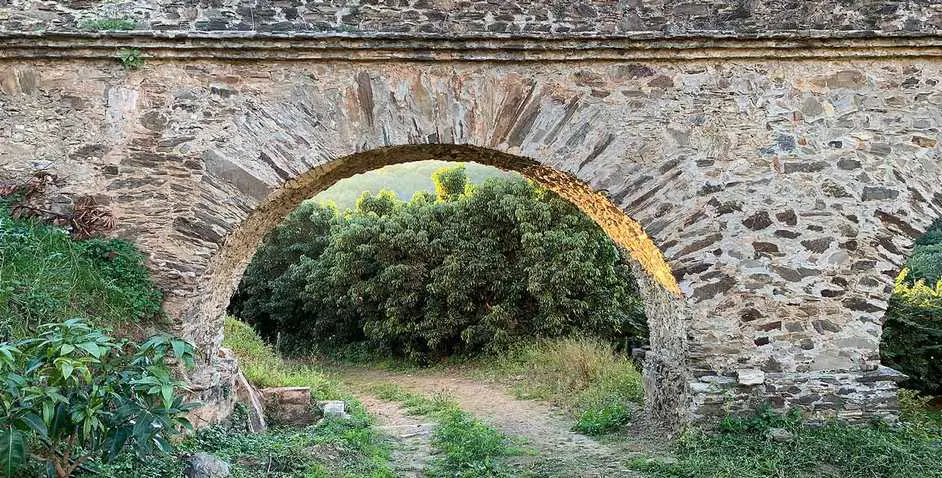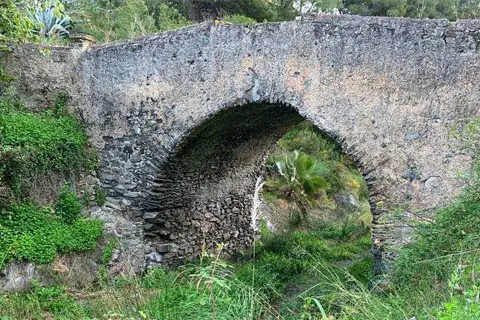Almuñécar is resplendent in ancient monuments that date back to Phoenician times (over 3000 years ago when the town was settled).
Through the Roman and Arab conquests amazing castles, aqueducts and bridges were built... Below you will find some of the more well-preserved ones...
San Miguel Castle
The San Miguel Castle is Almuñécar's best known and perhaps best overall
attraction other than its monuments. It is situated on the San Miguel Cerro, the large hill
on which the Old Quarter is built.
Penon del Santo
El Peñon Del Santo (the "Rock of Christ") is a series of rocks jutting
out to the Mediterranean Sea from the Old Quarter. It is the characteristic view
that you see in most tourist books on the area.
Fish Salting Factory
Below the San Miguel Castle is the ancient Phoenician Fish Salting Factory,
it dates from the Phoenician Punic period of the 4th Century B.C. and was expanded and
revamped during the Roman period.
Torre Monje
The Roman Columbarium Torre del Monje is a very well preserved burial
tomb dating from the 1st Century A.D.
The Aqueducts
Roman engineers built five aqueducts here, which still exist today, to
bring water from the valleys of the Rio Seco and Rio Verde. All five aqueducts are still
standing and four of them are still used for irrigation.
Incarnation Church
La Iglesia de la Encarnación, located in the town center,
behind the town hall (ayuntamiento), was the first church in the Granada province
built in the new style of the 17th Century.
La Albina
Located on the way to Salobrena you will find the ancient ruin of La
Albina. On the walls of this artifact the intricacy of Roman stone masonry is seen, with
arched shelves built into the walls for holding cinerary urns of the deceased.
Laurita Necropolis
The Phoenician necropolis Laurita is located on the Cerro de San
Cristóbal. It dates back to the 8th-7th Century B.C. and it is the oldest
Phoenician-Punic remain found in the province of Granada.
Najarra Palace
La Najarra Palace is a beautiful neo-Arabic, Moroccan-style building
inspired by the Arabic house-garden tradition. Inside you will find the local tourist office.
Roman Arch
Hidden in the dense fruit trees across from the town of Jete remains a
jewel of Roman architecture, an arch from a two thousand year old irrigation aqueduct.
Roman Baths
In the town center of Almuñécar are the Roman Baths dating to the 1st Century
A.D. They are in excellent condition and rest beside the roman aqueducts, which are one of
Almuñécar's main attractions.
Roman Bridge
In Cotobro is found the best remaining portion of a famous ancient
highway, the Roman Bridge of Cotobro. It is in excellent condition and definitely
worth a visit. The surroundings are somewhat overgrown, so dress appropriately.
Arab Pottery
Arab and earlier pottery abounds in the Costa Tropical. The best antiquities
collection is found in the Archaeological Museum. The most prized piece is an ancient Egyptian
urn from around 1600 BC
Noy Bridge
The Noy Bridge (Puente de Noy) is an ancient Phoenician burial
ground of 132 tombs dating back to the 8th century B.C
Who are we? An American expat with over 20 years of experience living and traveling in Spain, specifically in Malaga and
Granada. Darsey is a seasoned explorer of Andalucia. Drawing from decades of immersive experience, she offers deep insights
into this enchanting region of Spain, including off-the-beaten path destinations, the best places to stay, and the top bucket
list activities to try!
More...
Save money on your next trip with our favorite travel websites!















